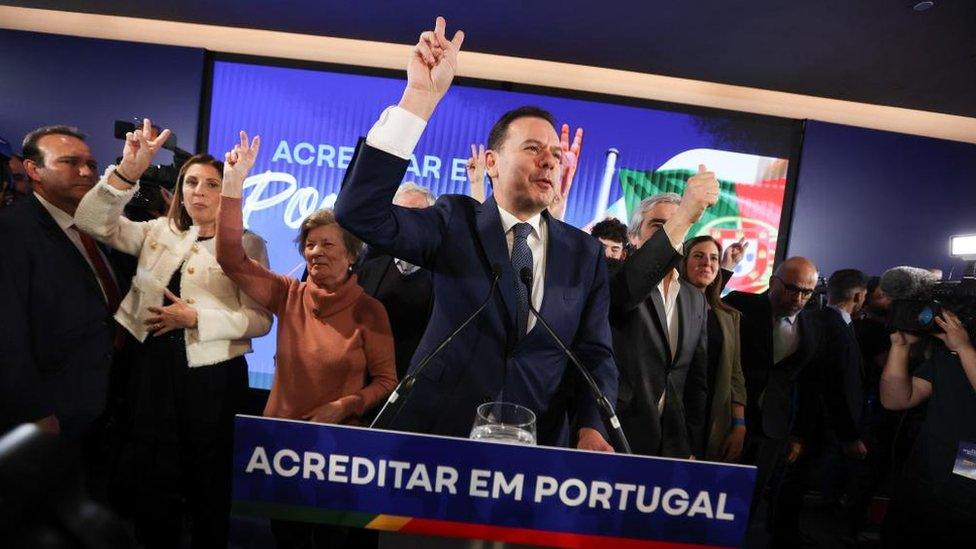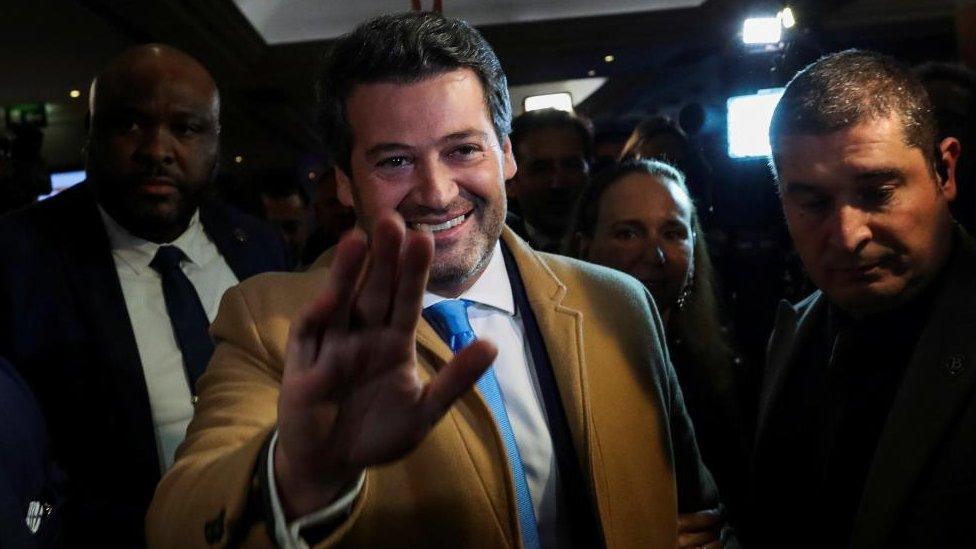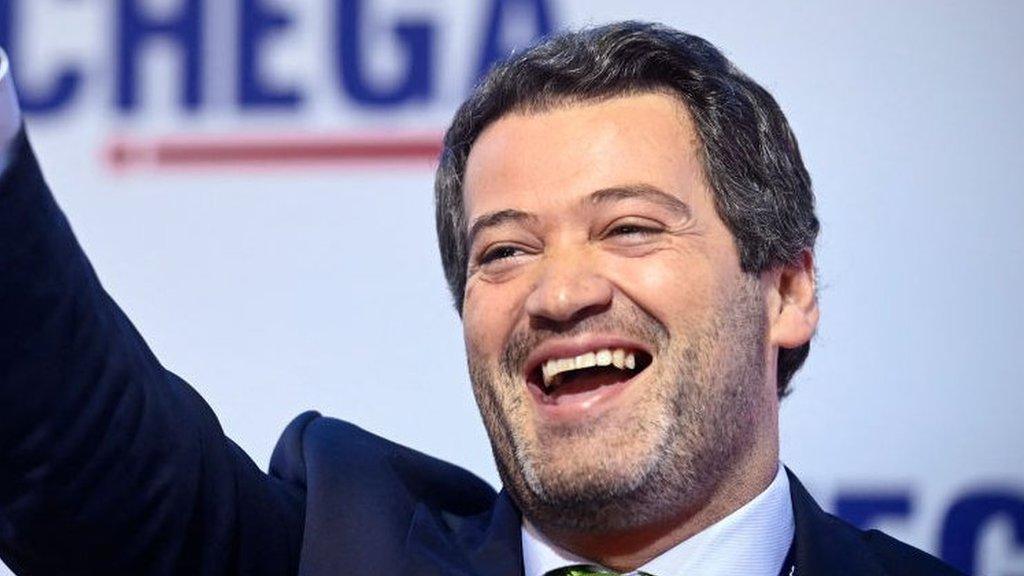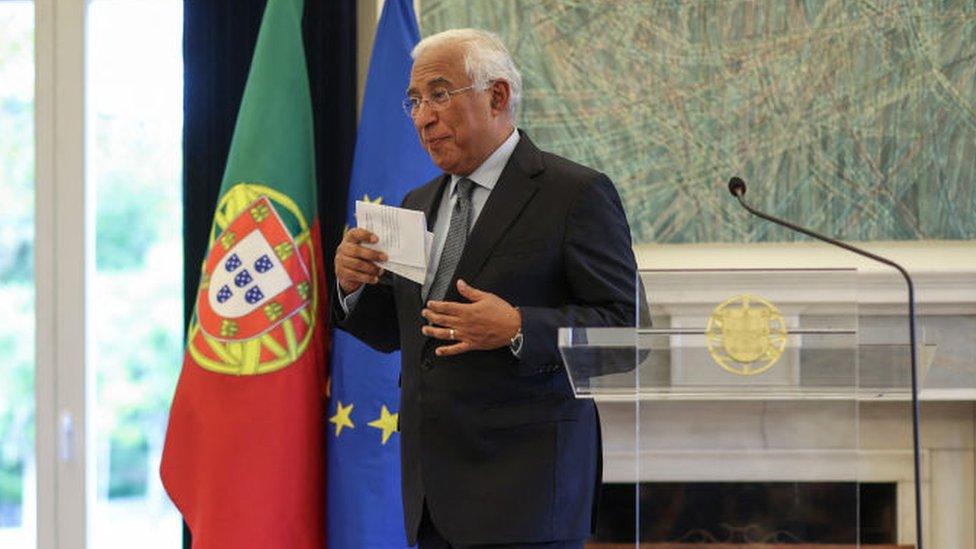Centre right wins Portuguese election as far right surges
- Published

Luís Montenegro faces a daunting task of forming a government
Portugal's centre right has claimed a narrow election victory, but has little chance of forming a majority government.
Democratic Alliance leader Luís Montenegro told supporters that the Portuguese had voted for change, although the margin of victory was less than convincing.
Both main parties polled about 29% of the vote.
Only the far-right Chega could claim a clear-cut success.
Five years after it broke into Portuguese politics, the party led by former football pundit André Ventura has secured 18% of the vote and 48 seats in the 230-seat parliament.
Political commentators say Portugal is facing its most fragmented parliament since the end of its dictatorship half a century ago.
Ten million Portuguese had the chance to cast their vote in Sunday's snap election, four months after Socialist Prime Minister António Costa stood down amid corruption allegations, even though he was never named as a suspect.
It was Mr Costa who warned Portuguese TV viewers late on Sunday night that they could be heading for a "possible tie" between the Socialists (PS) and the centre-right Democratic Alliance, with only four seats outside Portugal yet to declare.
But not long afterwards, the man who replaced him as Socialist leader, Pedro Nuno Santos, conceded victory, announcing: "We are going to lead the opposition, we will renew the party and attempt to retrieve those Portuguese who are unhappy with the PS."
Luís Montenegro told supporters that he was now convinced that the president of the republic would hand the centre right the task of forming the next government.
"I always said winning the elections would mean having one vote more than any other candidate, and only in those circumstances would I accept to be prime minister."
With all the votes counted, other than the four external seats, his Democratic Alliance was on 79 seats, two more than his Socialist rivals.
He said the voters had made clear they wanted a new government, a change of policies and greater priority given to dialogue between political leaders.
Former centre-right leader Luís Marques Mendes said there had never been an election night like this before: "I think we'll have fresh elections early next year."
It had all looked so much clearer when exit polls gave the centre right a clearer margin of victory. Supporters chanted "Portugal, Portugal" as their leader's face appeared on TV screens.
Turnout was the highest for years, at 66%, even though the last elections were only two years ago.
What was soon evident was that the far-right Chega (Enough) party had cemented its bid to be the third force in Portuguese politics.

André Ventura has his sights set on Chega taking part in a right-wing government
André Ventura's party secured 18% of the vote, after a campaign focused on corruption and immigration.
A former centre-right councillor, he and his party have set their hopes on becoming a kingmaker, and they hailed an "absolutely historic" night.
"This is the night that two-party rule ended in Portugal," he told cheering supporters. "Chega has historically surpassed one million votes in Portugal."
Luís Montenegro has already condemned Mr Ventura, a former party colleague, as xenophobic and racist and in his victory speech he made clear he would not make any deals with him.
The populists made dramatic gains, especially in the south including the Algarve, but fared less well in the northern coastal city of Porto.
The centre right has not been without its own problems. The Social Democratic Party, which dominates the Democratic Alliance, has been implicated in a regional scandal in Madeira.
The Chega leader said his party was ready to help build the next government. But even though he has watered down some of his policies, abandoning demands for chemical castration for rapists, there seems little chance of him having any role at this stage.
It is also clear that the two big parties will not find enough common ground between themselves to form a government.
That leaves the centre right looking at months of minority government, with the difficult task of securing support for next year's budget in October.
Socialist Finance Minister Fernando Medina warned of a political picture of "great fragility and instability".
After years of economic gloom, the Socialists can claim to have returned Portugal to growth of 2.3% last year, even though forecasts for 2024 are less rosy.
However, salaries are low and rents are soaring, which have led to increased dissatisfaction with the centre left.
Former presidential candidate Ana Gomes suggested that many voters in the Algarve may have backed Chega because the government had failed to respond to people's problems such as price rises and cuts in water supplies.
Related topics
- Published8 March 2024

- Published7 November 2023
